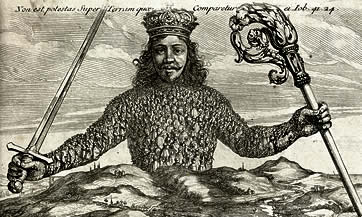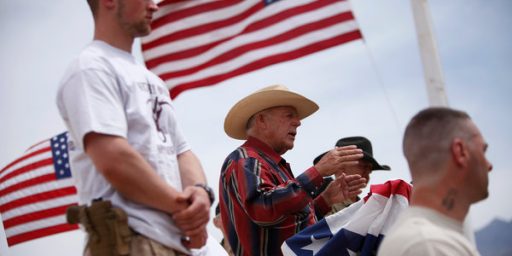The Government-Liberty Connection: Hobbes
An ongoing set of considerations on the relationship between liberty and government.
 To build off some ideas suggested in previous posts (here and here) let’s consider some arguments from political philosophy that are relevant both to the foundations of American political thought, but also that touch on claims made by Cliven Bundy about being a “sovereign citizen” which have led to assertions that he has the right to follow the laws he likes and to ignore the ones he doesn’t, even to the point of armed confrontation with legitimate authorities.
To build off some ideas suggested in previous posts (here and here) let’s consider some arguments from political philosophy that are relevant both to the foundations of American political thought, but also that touch on claims made by Cliven Bundy about being a “sovereign citizen” which have led to assertions that he has the right to follow the laws he likes and to ignore the ones he doesn’t, even to the point of armed confrontation with legitimate authorities.
BTW, my primary inspiration for these posts are people who like to repeat lines from documents and philosophers without ever considering how liberty is actually secured in the first place and why just shouting “freedom!” is not enough to actually access it. There is a complex synergy between freedom and order that is ignored by armchair philosophers.
The British philosopher Thomas Hobbes made a variety of claims about humanity, liberty, and government that influenced American political thought and that are generally relevant to a discussion of liberty, order, and self sovereignty. Hobbes argued that prior to the establishment of government that humans were sovereign in their own right (i.e., each kings of their own kingdoms of one) and therefore lived in a state of liberty. His basic claims (that men are born free and have the right to self-determination) are essential to the basics of classic liberalism and to notions that influence the US Founders. Further, whether we think actively think about or not, his logic of contract (also found in Locke, among others) profoundly influenced our national thinking about politics (think how we look at the US Constitution-we treat it as a sacred contract).
For Hobbes, life in a state of nature (i.e., where every man is a sovereign entity unto himself–as free as one can get) life is pretty unpleasant, because in the absence of “a common power to keep them all in awe” (i.e., no government of at all), one is too busy trying to survive to actually enjoy one’s liberty. The basic problem is that is not secure in one’s person nor one’s possessions because there is a lack of order. As he notes in Chapter 13 of The Leviathan:
Where there is no common power, there is no law; where no law, no injustice. Force of and fraud are in war the two cardinal virtues. Justice and injustice are none of the faculties neither of the body nor mind. If they were, they might be in a man that were alone in the world, as well as his senses and passions. They are qualities that relate to men in society, not in solitude. It is consequent also to the same condition that there be no propriety, no dominion, no ‘mine’ and ‘thine’ distinct, but only that to be every man’s that he can get, and for so long as he can keep it.
In other words: there can be no justice or shared morality because each individual, in their infinite freedom, can set whatever rules they want (since the self-sovereign, by definition, answers to no one). The only law of nature in this context is survival.
Back to the Bundy situation, the reference to “no dominion, no ‘mine’ and ‘thine’ distinct, but only that to be every man’s that he can get, and for so long as he can keep it” reminds me of the way Bundy and his supporters are behaving: as if they have to right to whatever they want, and will use to force to keep it. Their behavior underscores a lack of understanding of how the land they both own and that they claim use over came to be part of the United States (i.e., war with Mexico), how the state of Nevada was organized in the first place (i.e., via an act of the Congress of the United States, under the power of the Constitution of the US), and how the land has been maintained by the BLM (not to mention the general property rights that he has to protect the land over which he holds a title, as well as his cattle, etc.). Like far too many, he acts as if all he has is the result of the work solely of himself and his family. This is, of course, not the case, as all he has worked for has been in the context of a society and a legal structure enforced by government (local, state, and federal). It is impossible to have fully functioning economy, along with property rights, without a functional government.
Returning to Hobbes, life without government (true anarchy) is a state of war, because one never knows when force will be needed to enforce one’s sovereignty.
For ‘war’ consisteth not in battle only or the act of fighting, but in a tract of time wherein the will to contend by battle is sufficiently known, and therefore the notion of ‘time’ is to be considered in the nature of war, as it is in the nature of weather. For as the nature of foul weather lieth not in a shower or two of rain but in an inclination thereto of many days together, so the nature of war consisteth not in actual fighting but in the known disposition thereto during all the time there is no assurance to the contrary.
This leads to a constant state of fear and defensiveness, because one never knows when one might be attacked. As such, no society can be formed, and none of the advantages that accrue to those who cooperate can be created:
Whatsoever therefore is consequent to a time or war where every man is enemy to every man, the same is consequent to the time wherein men live without other security than what their own strength and their own invention shall furnish them withal. In such condition there is no place for industry, because the fruit thereof is uncertain, and consequently no culture of the earth, no navigation nor use of the commodities that may be imported by sea, no commodious building, no instruments of moving and removing such things as require much force, no knowledge of the face of the earth; no account of time, no arts, no letters, no society, and, which is worst of all, continual fear and danger of violent death, and the life of man solitary, poor, nasty, brutish, and short.
In summary: almost all of the good things in life, even basic ones like food, clothing, and shelter, require some level of cooperation with other humans. Few of us are truly self-sufficient—and even when we work by ourselves to create outcomes, we need others to help protect the fruits of our labor (if anything by agreeing to abstain from taking it, as well and being sufficiently secure in their own outputs that they are not desperate enough to steal the work of others).
Those who watch the Walking Dead will recognize this world: one in which trust is problematic because there are no rules to bind the behavior of humanity. The cardinal imperative becomes survival and at any moment that which requires cooperation to build can be torn down. It is a situation in which each new encounter with an unknown person means asking the question: is it safer to try and cooperate with this new person or is it safer to kill them before they kill me? For a more literary, although not quite as bleak (and not fully complete) iteration of Hobbes’ state of nature see Lord of the Flies.
Now, Hobbes goes on to argue for a very extreme solution: the surrender of all personal sovereign power to a singular, all-powerful government who can then bring order to the chaos and allow us, as human beings, to enjoy the fruits of cooperation. I am not suggesting, by the way, that Hobbes is fully correct in his assessment. I would argue that he overstates the severity of anarchy and he clearly proposes an extreme solution to the woes he sees in nature. However, he is not wrong about a few fundamental issues.
First, perfect liberty is not desirable, because a state of perfect liberty, with no government to create the institutions needed for cooperative activity, ends up being pretty miserable. In perfect liberty the thief is also perfectly free. My only defense against him is being stronger and/or more clever than he. This means, ultimately, that I spend so much time fending off the thieves excising their perfect liberty that I cannot enjoy my own.
Second, we need some level of order to enjoy liberty. In other words, you can’t actually have 100% liberty because of the aforementioned problems. Hence, by definition, access to liberty means some amount of order, i.e., government, is needed. Liberty cannot exist without government. And, it should be noted, a government with some powers to enforce its rules—which is why the Articles of Confederation failed and the US Constitution was created. Indeed, one of the grand ironies of events like the Bundy Ranch is that Bundy, despite the copy of the Constitution in his breast pocket, is making anti-Federalist arguments.
Now, none of this settles the issue of the appropriate mix of laws and liberty, but it should be enough to demonstrate the fallaciousness of claims about liberty in the absences of government. However, a fundamental point is this: once one realizes that perfect liberty is impossible sans government, then the real conversation has to start about what government is, what is should do, and what its extent should be.
My goal in this post is to spark thought, not come to a final conclusion. Indeed, if it is not clear, I am not a fan, ultimately, of Hobbes’ conclusions but he does make some fundamental points about liberty and government that can spark some useful conversations.
Next: Locke.






The only problem I have with Hobbes’ assessment is I think he understates the sense order that existed in tribal societies. We are genetically tribal creatures and have been for a very long time and recognized the need for order. In even the most primitive tribes there was usually someone who directed the defense against enemy tribes and arbitrated disputes. Jared Diamond’s study of the tribal culture of inland New Guinea is most informative.
@Ron Beasley: Hobbes was definitely writing in a hypothetical sense, or if not his assertions about the state of nature can be understood that way. While a state of nature involving conflicting tribes wouldn’t nearly be as bad as the one he lays out, it’s still a far cry from honest society.
Anyone watching Game of Thrones can see some of this stuff in action too, where the ultimate loyalty has to be to Family because you honestly can’t be sure of anyone else.
I always loved the Latin term for the state of nature – bellum omnium contra omnes, “the war of all against all.”
@Tillman: To cut Hobbes a break I suspect at the time of his musing cultural anthropology was at best in it’s infancy. Tribal cultures were simply not worthy of study.
Nice post, Steven.
@Ron Beasley: I think Hobbes overstates any number of things, but as noted above, he was more engaging in a thought experiment that. He was attempting an accurate picture of humans pre-government.
@David in KC: Thanks.
Anarchy is like one of those new elements which are created in the lab and exist for billionths of a second before disappearing. Anarchy is purely theoretical. In reality government in some form comes instantly into existence, from the domination of the family, usually by the oldest male, on up through tribes and villages and city states and nation states. We are never faced with a choice between anarchy and government, the choice is always between this type of government and that other type.
The trick is to maximize personal liberty while minimizing insecurity. The better job you do of that, the more complex and evolved your society is likely to become, which will in turn force choices and require that you re-balance liberty and security. The optimum balance changes as circumstances change, which is why the balance that may have been the best achievable in1787, no longer worked by 1860, and again in 1932 we had a major re-balancing, and again in the 1960’s, etc…
@Steven L. Taylor: I understand “thought experiments.” I am a retired physicist and “thought experiments” are about all we have done for a few decades!
@Ron Beasley: of course. 🙂
@michael reynolds: Right. More sophisticated social and economic goals appear to require progressively more government involvement to reach and then maintain, which makes sense given government is really us.
@Ben Wolf:
People tend: 1) To look backward and not re-evaluate data as they along. 2) To feel loss more acutely than gain. 3) To hold a limited, narcissistic world view.
A guy can’t do X anymore but he’s not capable of thinking well, I can’t do X anymore, but I can do Y and Z that I didn’t used to be able to do, so net plus. They focus on the past: stuff they once did. They feel loss and barely register the countervailing gains. They give no weight to anything beyond their narrowest self-interest. So they wander off into this resentful fantasy of oppression when in fact the world around them is both more secure and freer. Pretty soon they’re some lunatic rancher ranting about negroes.
Steven, this almost sounds like “you didn’t build that”. (What are you, some kind of pinko like the president???)
@Ben Wolf: As Teddy Roosevelt argued, the creation of industrial capitalism rendered small, limited government obsolete.
@Tillman:
Yeah, that is a good one. If one reads the early history of Rome (the really early stuff, before the Punic wars), what does one read about? Endemic tribal & city-state warfare. It was practically non-stop. A war of all against all.